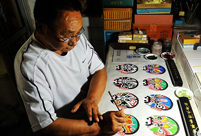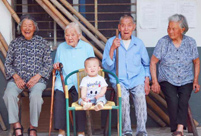 Global ambassadors of ecotourism gather in Nanjing
Global ambassadors of ecotourism gather in Nanjing
 Taiwan woman marries into Kazak family, 100 sheep plus a flat as dowry
Taiwan woman marries into Kazak family, 100 sheep plus a flat as dowry
 College girls take graduation photos under water in Chongqing
College girls take graduation photos under water in Chongqing
 Cartoon: Xi and football
Cartoon: Xi and football
 Chinese influence sweeps ROK
Chinese influence sweeps ROK
 Post-90s beauty boxer grapples four men
Post-90s beauty boxer grapples four men
 3,000-year-old tea town through lenses
3,000-year-old tea town through lenses
 22 archaeological sites along Silk Road in China
22 archaeological sites along Silk Road in China
 Football babies, Samba dancers embrace 'World Cup'
Football babies, Samba dancers embrace 'World Cup'
 Beautiful scenery along China’s Grand Canal
Beautiful scenery along China’s Grand Canal
BEIJING, July 10 -- China's foreign aid, a paradigm of South-South cooperation and mutual help between developing countries, has promoted the realization of the UN Millennium Developing Goals, thus integrating the Chinese dream into the world's dream.
Half a century ago, the late Chinese Premier Zhou Enlai put forward the Eight Principles of Foreign Aid, the foundation of China's foreign aid policy.
On Thursday, China issued a white paper which detailed the country's foreign assistance from 2010 to 2012 to demonstrate its determination to continue its activities in this regard based on the principles of mutual respect, equality, keeping promises and mutual benefits.
Looking back on China's 64-year history of providing foreign aid, it is one of mutual assistance based on equality, common development and deepening friendship between China and other developing countries.
As of 2010, China had offered aid to 161 countries and more than 30 international and regional organizations, already providing about 41.03 billion U.S. dollars.
From 2010 to 2012, China allocated 14.41 billion dollars for foreign assistance in the forms of grant, interest-free loan and concessional loan, according to the white paper released on Thursday.
China has provided foreign assistance in such forms as undertaking complete projects, dispatching medical teams and volunteers, offering emergency humanitarian aid, and reducing or exempting the debts of the recipient countries.
China's foreign aid has helped the recipient countries develop their national economy, improve their people's livelihood and promote social progress, which has earned respect and reliance from these countries and shown the world that China is a responsible major developing country.
Furthermore, the Chinese model of providing foreign aid adheres to the principles of not imposing any political conditions, not interfering in the internal affairs of the recipient countries and fully respecting their right to independently choose their own paths and models of development.
China, still a developing country itself, treats recipient countries equally regardless of the difference in their sizes.
China always regards providing assistance to developing countries as an international duty it should fulfill. It has helped the recipient countries conduct projects closely related to the production and living of local people, shared its experience with these countries and effectively improved the level of their self-development.
Today, China is facing an increasingly complicated environment abroad for foreign assistance as a multilateral and globalized world is countering such global challenges as climate change, food security and environmental pollution, as well as an imbalanced world economy and a widening gap between the rich and the poor.
At home, China has to deal with the arduous task of development. However, China never abandons its mission to provide foreign assistance as it reflects the need to enhance South-South cooperation and the philosophy of building a community of shared destiny.
As a responsible shareholder on the global stage, China's foreign aid accords with the eight Millennium Developing Goals -- which range from halving extreme poverty rates to halting the spread of HIV/AIDS and providing universal primary education by the target date of 2015 -- a blueprint agreed upon by all the world's countries.
In an era of seeking the progress of civilization and peaceful development, China is willing to work with the international community to contribute to building a harmonious world and make the 21st century one that allows everyone to share the fruits of development.
 How Chinese men kill the time when their wives practice square dancing?
How Chinese men kill the time when their wives practice square dancing? Chinese Navy frogmen in training: photos
Chinese Navy frogmen in training: photos Lishui, city of longevity with 186 healthy men above 100 years old
Lishui, city of longevity with 186 healthy men above 100 years old Hong Kong Fashion Festival kicks off
Hong Kong Fashion Festival kicks off Germany crush Brazil to advance to World Cup final
Germany crush Brazil to advance to World Cup final Danish badminton team plays Chinese social media users on Asia tour
Danish badminton team plays Chinese social media users on Asia tour Art on eggshells
Art on eggshells Test flight of Russian amphibian BE-103 in Shenyang, NE China
Test flight of Russian amphibian BE-103 in Shenyang, NE China Stewardesses of CHR trains experience walk with white cane
Stewardesses of CHR trains experience walk with white cane Chengdu police use social media to boost recruitment
Chengdu police use social media to boost recruitment Secrets unveiled in restoration of the 800-yr-old Buddha
Secrets unveiled in restoration of the 800-yr-old Buddha Heavenly path in Chongli grassland
Heavenly path in Chongli grassland Happy Birthday to "Yuanzai"
Happy Birthday to "Yuanzai" China's manned submersible Jiaolong opens to public
China's manned submersible Jiaolong opens to public Roast Duck Restaurant celebrates 150th anniversary
Roast Duck Restaurant celebrates 150th anniversaryDay|Week|Month